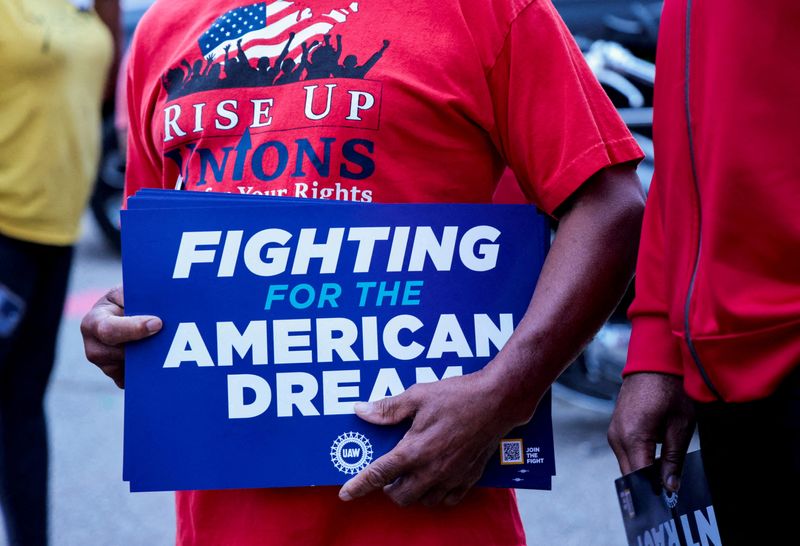By David Shepardson
(Reuters) -Union workers at Volvo (OTC:VLVLY) Group-owned Mack Trucks went on strike on Monday after overwhelmingly rejecting a proposed five-year contract, the United Auto Workers said, the latest tentative labor agreement in the U.S. to be voted down.
About 73% of the unit's 4,000 workers in Pennsylvania, Florida and Maryland voted against the deal that included a 19% pay raise, said the UAW, which is in the midst of contract talks with Detroit's Big Three automakers. Ford Motor (NYSE:F) in those talks has offered a 23% wage hike.
The proposed Mack deal had also included a $3,500 ratification bonus, improved retirement benefits, additional vacation for some employees and a reduction in the time needed to get to top pay.
In online forums, some Mack workers complained the raise was too small to keep up with inflation.
“We don't see ourselves as disconnected from the struggle of the Big Three," said Will Lehman, a material technician who works at Mack's Lehigh Valley facility in Pennsylvania.
He added that he was displeased that the UAW endorsed a "phony" tentative agreement to be voted on. The cost of living had gone up more than the 19% Mack offer, Lehman said.
UAW President Shawn Fain, who had backed the Mack deal, said late on Sunday: "I'm inspired to see UAW members at Mack holding out for a better deal, and ready to stand up and walk off the job to win it."
Mack President Stephen Roy said the company was "surprised and disappointed" by the strike.
Mack "clearly demonstrated our commitment to good-faith bargaining by arriving at a tentative agreement that was endorsed by both the International UAW and the UAW Mack Truck Council," Roy added.
Mack, which was bought by Volvo in 2000, is one of North America's largest makers of medium-duty and heavy-duty trucks.
The UAW said it would contact Mack to set dates to resume bargaining.
"UAW members and workers across the economy are mobilizing to demand their fair share," the UAW said in a letter to Mack. "The union remains committed to exploring all options for reaching an agreement, but clearly we are not there yet."
US LABOR UNREST
Unions negotiating new contracts in the auto, shipping and healthcare industries have used labor actions to keep employers off-balance this year. Polls have shown most Americans broadly support the unions' demands.
In the last 12 months, freight rail workers and employees at shipping company FedEx (NYSE:FDX) have rejected tentative agreements between union negotiators and companies before eventually reaching deals.
The UAW has been on a targeted strike against facilities of the Detroit Three automakers since Sept. 15. About 25,000 of the 146,000 UAW employees at General Motors (NYSE:GM), Ford and Chrysler parent Stellantis (NYSE:STLA) are on strike.
Fain said on Friday the union would not expand the strikes, citing progress in talks.
Canadian workers at GM also face a contract talk deadline at midnight on Monday (0400 GMT on Tuesday) that could lead to another strike.
Stellantis said on Monday it was furloughing another 570 workers in Michigan and Indiana, bringing the total to 640, citing the impacts of the UAW strike, specifically storage constraints.
GM said it was boosting its layoffs by about 200 to 2,300, while Ford said it was furloughing another 70 employees in Michigan as a result of the strike, raising the total to 1,865.
GM's revised offer did not match the 23% pay raise proposed by Ford. On Friday, the UAW said GM agreed that workers at joint venture battery plants could be covered by union contracts, but GM offered no details on Monday.
On Monday, Deutsche Bank estimated GM has lost 34,176 vehicles of production during the strike, Ford 21,296 vehicles and Stellantis 18,893 vehicles, reducing total Detroit Three earnings by $946 million to date.

Mexico's auto parts industry is expected to register a $412 million hit to production by Friday, a trade group said on Monday.
Anderson Economic Group estimates a total economic loss of $5.5 billion through the third full week of the strike, including in lost wages, $2.68 billion in automaker losses, $1.6 billion for suppliers and $1.26 billion in dealer and customer losses.